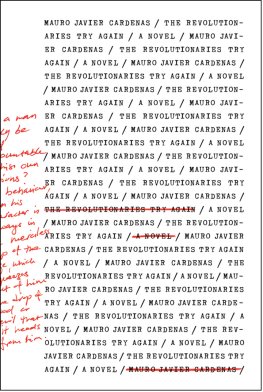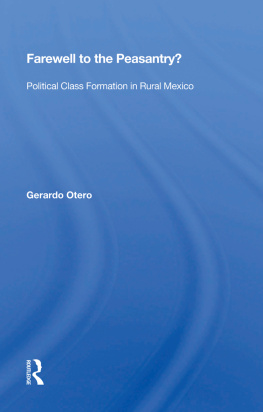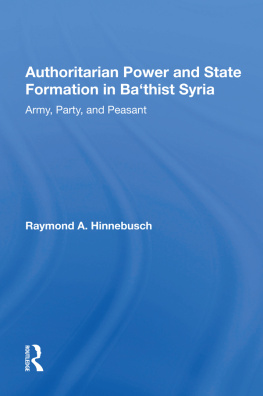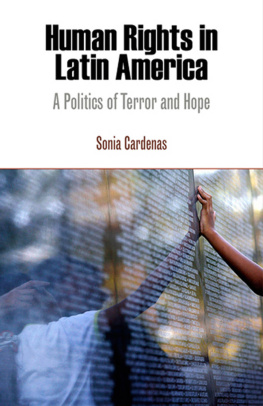
Herewith a major study of two towering political leaders of the Mexican Revolution: Lzaro Crdenas and Adalberto Tejeda. Based on extensive original research, the book perceptively analyses the careers, ideologies, and political strategies of two leaders known as notable radicals, who mobilized powerful popular movements in their respective states, Michoacn and Veracruz. Eitan Ginzberg sheds a great deal of light on processes of popular mobilization and state-formation in the 1920s and 30s, with detailed analyses of both land reform and anticlericalism; he also offers a provocative contrast between the two leaders, suggesting why Tejedas intransigence led to ultimate failure, while Crdenas pragmatic approach carried him to the presidency. Alan Knight, Professor Emeritus of Latin American History, University of Oxford, author of The Mexican Revolution (CUP 1986)
Lzaro Crdenas and Adalberto Tejeda, veterans of the Revolution and prominent governors of Michoacn and Veracruz from 1928 to 1932, strived to make Mexico a modern and just state on the basis of the revolutionary Constitution. Three key obstacles confronted them: the conservative approach of the political Center; the political weakness of their own power base; and the opposing power of the farmers and their supporting elements - the Church and the army.
This book discusses the different avenues to reform these leaders took and their short- and long-term implications. Crdenas sought to strengthen his position through the ruling party (PNR), while reinforcing local agrarian forces and opening channels of direct empathetic communication with the Church and the army. Tejeda attempted to strengthen his position in the federative arena, bypassing the political Center via the National Peasant League (LNC - Liga Nacional Campesina), making a sweeping radical reform while attacking uncompromisingly all the traditional elements of Veracruzan society.
Both political projects had unprecedented success but totally different implications. The Cardenista power base led its author to the next Presidency, during which he implemented a remarkable agrarian project. Tejedas power base led to the utter annihilation of his political power structure and many of his agrarian achievements, as well as to his failure in the struggle for presidency. From that point of view, only a bureaucratic, center-based reform initiative could succeed, while a local, radical, adventurous transformation was doomed to failure. The fate of the two governors corresponded to the fate of national revolutionary reformism and thus to the destiny of Mexico.
Cover illustration: Diego Rivera, Avila Morning (1908), courtesy of the National Art Museum of Mexico.
Eitan Ginzberg is the author of Lzaro Crdenas, gobernador de Michoacn, 19281932 (1999), and Genocide: Conflictual Encounter - The destruction of the Indian peoples of Spanish America (2009/2015). His research focuses on questions of infra-political resistance, history and culture of Latin America, and the study of genocide. Dr. Ginzberg is a senior lecturer at the Kibbutzim College of Education in Tel Aviv, and at the Sapir Academic College in Sderot.
Copyright Eitan Ginzberg 2015.
Published in the Sussex Academic e-Library, 2015.
SUSSEX ACADEMIC PRESS
PO Box 139
Eastbourne BN24 9BP, UK
and simultaneously in the United States of America and Canada
All rights reserved. Except for the quotation of short passages for the purposes of criticism and review, no part of this publication may be reproduced, stored in a retrieval system or transmitted in any form or by any means, electronic, mechanical, photocopying, recording or otherwise, without the prior permission of the publisher.
British Library Cataloguing in Publication Data
A CIP catalogue record for this book is available from the British Library.
Library of Congress Cataloging-in-Publication Data
Ginzberg, Eitan, author.
Revolutionary ideology and political destiny in Mexico, 19281934 : Lazaro Cardenas and Adalberto Tejeda / Eitan Ginzberg.
pages cm
Includes bibliographical references and index.
ISBN 978-1-84519-694-3 (hb : alk. paper)
ISBN 978-1-78284-232-3 (e-pub
ISBN 978-1-78284-233-0 (e-mobi)
ISBN 978-1-78284-234-7 (e-pdf)
1. MexicoPolitics and government19101946. 2. Cardenas, Lazaro, 18951970Political activityMexicoMichoacan de Ocampo. 3. Tejeda, Adalberto, 18831960Political activityMexicoVeracruz-Llave (State) I. Title.
F1234.G488 2015
972.082dc23
2014046335
This e-book text has been prepared for electronic viewing. Some features, including tables and figures, might not display as in the print version, due to electronic conversion limitations and/or copyright strictures.
Acknowledgements
This book could never have been written without the assistance of a great many people who supported, and guided me. I owe special thanks to the late Dr. Leopoldo Zea of the Centro Coordinador y Difusor de Estudios Latinoamericanos at the Universidad Nacional Autnoma de Mexico (UNAM), who took me under his wing professionally and academically while I was staying in Mexico between the years 19911992, and again in 2001. I would also like to express warm thanks to the helpful staff of the Hemeroteca Nacional, particularly the director, Aurora Cano Andaluz who allowed me to photocopy all the press material relevant to my research.
In addition, I would like to acknowledge my debt to the respective staffs of the statistical departments in the agrarian reform offices of Morelia and Jalapa (Secciones de Estadstica de la Secretara de la Reforma Agraria), who spent months systematically compiling a broad range of statistical data from 4,000 ejidal communities for me. In Morelia this was Estanislao Benomea Lpez and the director of the department, Josefina Lpez Vargas, while in Jalapa I was aided by the director, Yolanda Ramrez, and Mara Teresa Cabrera Vera. Particular mention should be made for the invaluable assistance of the federal delegate (Delegado Federal) and director of the Jalapa agrarian reform office, Lic. Luis Ordinola Heredia, who not only gave me the benefit of his extensive knowledge but also offered me all the services of his office.
Warm thanks go to the staff of the Veracruz central archive in Jalapa, headed at the time by Lic. Mara Elena Garca Diaz; to the staff of the congressional archive in Morelia, directed by a man who became a personal friend and advisor since I researched my Masters thesis in 1989 and until the present, Dr. Javier Tavera Alfaro; to the former director of the municipal archive of Zamora, Michoacn, and today the President of the College of Michoacn (El Colegio de Michoacn) Dr. Martn Snchez Rodriguez, a friend and a scholar who brought me closer to the complicated questions of water and irrigation in the Mexican village; to the staff of the Centro de Estudios de la Revolucin Mexicana Lzaro Crdenas, in Jiquilpan and to the wonderful team of historians at the Centro de Estudios Histricos at the Universidad Veracruzana in particular Mtra. Olivia Domnguez Prez (today the general director of the Archivo General del Etado de Veracruz); to Mtra. Soledad Garca Morales and Dr. David Skerritt Gardner, who have helped me immeasurably with advice, explanations and important bibliographical references. Among my Michoacn connections, I would like to mention in particular the late Dr. Luis Gonzlez y Gonzalez, who welcomed me whenever I needed his advice and orientation to his home in Mexico, where he was always ready to discuss any subject, and referred me to other experts for specific aspects of Michoacn regional history.








